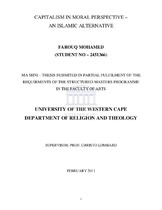Capitalism in moral perspective - an Islamic alternative
Abstract
Our time has been called the age of economics; the social philosopher Edmund Burke first used this term to characterize the eighteenth century, which was his own century and also the century of Adam Smith, but this expression has since become even more appropriate. While in the middle ages
the beliefs that divide society and set large blocks of people at war with each other were theological in nature, in our time the great ominous divide between peoples is based on differing philosophies of economics (Lux, 1990:1). Economists are now key advisors to governments, presidents, prime ministers, and even autocrats and dictators, in addition to their obvious and expected place in the world of business, banking, and finance. The celebrated twentieth-century economist John Maynard Keynes gives an apt description
of the influence of economics in our time: “The ideas of economists and political philosophers, both when they are right and when they are wrong, are more powerful than is commonly understood.”
(Lux, 1990:1). The analysis presented in this study spreads over four chapters followed by a concluding chapter and the bibliography. For the full understanding of the need of this analysis and where it comes from; the methods that are followed; the literature used; the normative framework for evaluating the different systems, a brief survey is presented in the first chapter. The second chapter argues the need for an economic system that functions economically and morally; one that satisfies the criteria set
by the widely accepted theory on justice by John Rawls. An analysis of the advantages and disadvantages, but especially the moral and practical shortcomings, of the current dominating global system, Capitalism, based on short-term human vision and planning, and a preliminary critical moral assessment thereof, is given in chapter three. The fourth chapter briefly presents the Islamic economic system as a possible alternative, more reliable, economic system, claiming to depend on divine knowledge. The strengths of this system are pitted over against the shortcomings identified
in Capitalism and the possible viability of the Islamic system is tested against the criteria of John Rawls’ theory of justice. The concluding fifth chapter summarises the outcomes of the investigation and presents some recommendations for a viable economic philosophy and system for the future.

